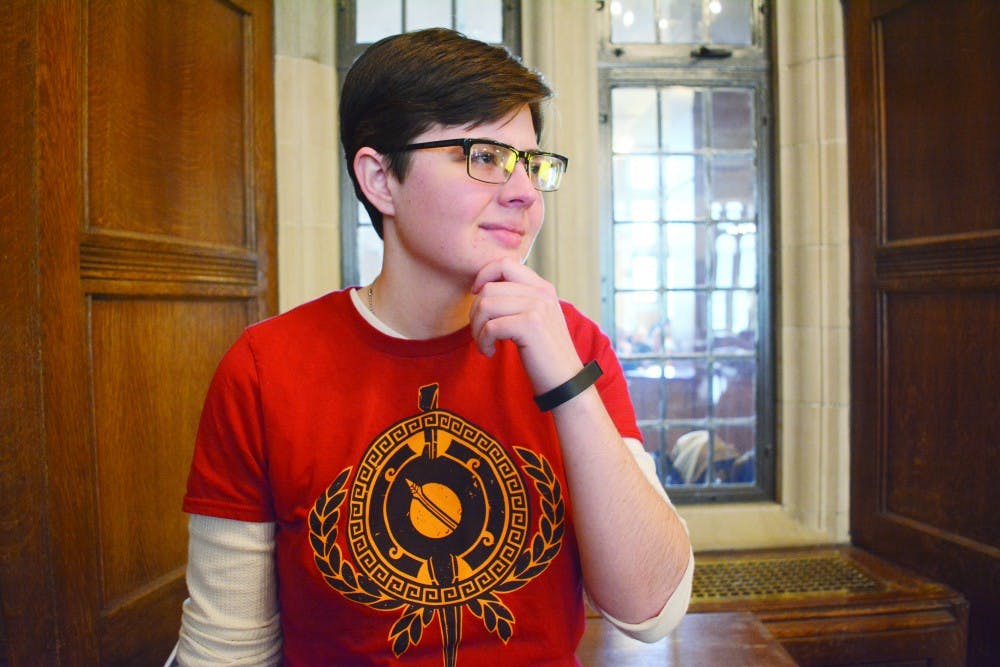A grin sneaked across Tom Williams’ lips as they scrolled through their phone, looking for a picture of the first time they ever wore a dress. According to Williams, it was one of the happiest moments of their life.
“It was euphoric,” they said. “My cheeks were, at the end of that night, in pain because of how much I had been smiling.”
In the photo, Williams, a 25-year-old genderless transwoman, beams in an H&M dress. They said everyone should have the opportunity to feel this delighted, as long as it's legal and harmless.
Body image, according to Judy Lightstone author of "Improving Body Image," is the way we see ourselves and how we believe others see us. However, according to Williams, body image is almost always discussed from a cisgender perspective, with a central focus on women’s bodies.
Aimes Dobbins,a 20-year-old a nonbinary transmasculine undergraduate, said they believe the current narrative about body image is problematic given that it mainly focuses on eating disorders and weight.
“I don’t think we talk about it enough.” Dobbins said. “I think it just so happens that the LGBT community has so many other things to do with, that maybe it’s hitting the back burner.”
Though everyone has potential body image concerns, Dobbins said they don’t think cisgender people are able to truly comprehend what it’s like to be transgender with these issues.
“It’s like a double whammy,” they said. “We’re dealing with what cisgender people deal with and then in addition we’re also dealing with, more so, the feelings that come with being trans. ... I think it’s just different. Being nonbinary is different, being trans is different.”
Dobbins admits to dealing with being self-conscious about how people view them and sometimes disassociates with themselves, but recognizes their ability to speak to others and good actions they do for their friends.
When a friend took pictures of Dobbins for a class project, they said they felt comfortable with letting the world see them.
“I just feel attractive and I feel happy when I look and it,” they said. “I just love it.“
But feelings of confidence can easily be disrupted for the transgender and gender nonconforming communities if they experience gender dysphoria or body policing.
Gender dysphoria — a feeling of dissonance between gender identity and the way people perceive you according to Williams — is a feeling some transgender individuals experience that can have an effect on body image.
“It feels to me like the way bending metal sounds,” Williams said.
Diana Chaudron, a nonbinary junior, experienced body policing when an angry employee forced them out of an IMU bathroom, believing Chaudron’s gender expression didn’t match the bathroom assignment.
“I felt terrible, like the whole day,” they said. “It made me feel really dumpy. I ended up telling my mom about it.”
Evelyn Smith, a gender-fluid transwoman working on her graduate degree and assisting at Middle Way House, said she was taught for 25 years to hate her body, and it’s not something she feels she can just be free of.
“So there have been times when I have felt hopeful,” she said. “I cannot think of a time when I felt, ‘Oh, this is good, this is where I want to be.’… I’m skeptical that I will ever reach that point.”
Smith said there are things she likes about herself, but she wonders if the messages she’s received her entire life about transgender bodies and fat bodies has created irrevocable damage.
“I will say that I have made concerted efforts and in particular lately made a conscious, continuous effort to live in my body rather than in spite of my body,” Smith said. “That’s a struggle. It’s a struggle to feel connected to something that you’re told is wrong.”
She said in order to face these issues we must disrupt and reconstruct the ways in which society monitors our bodies.
“We have to stand with each other,” Smith said. “I will be there to stand with trans people, and I would like it if everyone else were there to. I think there’s a lot of power in there. And sometimes, that’s the only power we have.”






